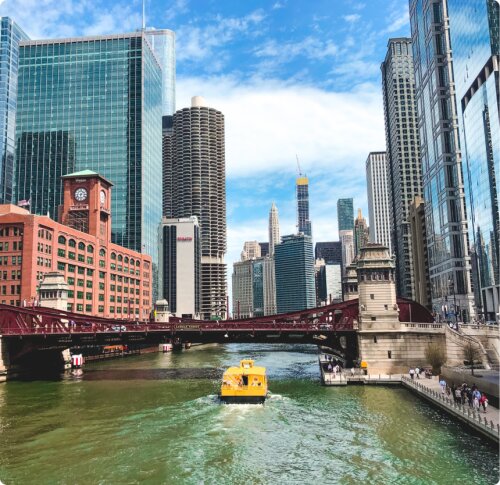Best Commercial Real Estate Lawyers in Illinois
Share your needs with us, get contacted by law firms.
Free. Takes 2 min.
Free Guide to Hiring a Real Estate Lawyer
Or refine your search by selecting a city:
List of the best lawyers in Illinois, United States
About Commercial Real Estate Law in Illinois, United States
Commercial real estate law in Illinois governs the purchase, sale, leasing, and development of properties used for business purposes. This includes office buildings, retail spaces, warehouses, multi-family apartment complexes, and industrial properties. The area is regulated by federal, state, and local laws, each contributing to how transactions are managed and property rights are enforced. Due to the significant financial investments often involved, understanding the legal landscape is crucial for both buyers and sellers of commercial real estate in Illinois.
Why You May Need a Lawyer
Many issues can arise during commercial real estate transactions in Illinois, making the assistance of a qualified attorney invaluable. Some common reasons you may need legal help include:
- Drafting, reviewing, and negotiating complex purchase agreements or leases
- Addressing zoning and land use questions
- Managing environmental compliance concerns
- Assisting with due diligence investigations and title searches
- Handling disputes, breaches of contract, or litigation
- Securing financing and advising on mortgage options
- Navigating evictions or tenant rights issues
- Ensuring compliance with local, state, and federal regulations
- Structuring property ownership through entities or partnerships
Engaging a knowledgeable attorney can help safeguard your interests, limit your risks, and resolve any legal conflicts that might arise.
Local Laws Overview
Illinois commercial real estate laws are shaped by state statutes, local ordinances, and federal regulations. Key aspects include:
- Licensing Requirements - Real estate transactions must typically involve a licensed broker or agent per the Illinois Real Estate License Act.
- Disclosure Obligations - Sellers may be required to disclose certain property defects or environmental hazards, especially if known to impact property value or use.
- Zoning, Planning, and Land Use - Local governments regulate the type of uses allowed on properties and may impose restrictions, including setback requirements and signage controls.
- Environmental Laws - Both state and federal rules mandate environmental due diligence, particularly for properties with a potential risk of contamination.
- Lease Regulations - While commercial leases in Illinois are largely determined by contract, parties must still comply with anti-discrimination laws and other relevant statutes.
- Eviction Procedures - Processes for evicting commercial tenants are governed by state law, though terms are usually spelled out in the lease agreement.
- Real Estate Taxes - Illinois property taxes can from county to county, and understanding the assessment and appeals process is important for investors and owners.
Local municipalities may also have ordinances that affect the development, use, and transfer of commercial properties, so consulting a local attorney is highly recommended.
Frequently Asked Questions
What is considered commercial real estate in Illinois?
Commercial real estate includes any property used exclusively for business or income-generating purposes such as offices, retail stores, industrial buildings, warehouses, and apartment complexes with five or more units.
Is a lawyer required for commercial real estate transactions in Illinois?
While Illinois does not legally mandate a lawyer for these transactions, it is highly advisable to engage an attorney due to the complexity and high value of most commercial deals.
What are the main steps in a commercial real estate transaction?
The typical process involves negotiation, drafting and review of a contract, due diligence (including inspection and title search), financing, possibly zoning or environmental review, and finally, closing.
How are commercial leases different from residential leases in Illinois?
Commercial leases are less regulated by state law, allowing parties greater freedom to negotiate terms. Unlike residential leases, there are fewer statutory protections for tenants.
What is due diligence in a commercial real estate deal?
Due diligence is a comprehensive review period where buyers investigate the property’s financials, title status, zoning compliance, environmental conditions, tenant leases, and other relevant information before finalizing the purchase.
How are property taxes assessed on commercial property?
Each county in Illinois determines the assessed value based on property use, income, market value, and other factors. Owners can appeal assessments they believe are too high.
Can zoning laws impact my commercial real estate plans?
Yes, zoning ordinances determine what businesses and activities are permitted on a property. Proposed changes in property use may require zoning variances or special permits from local authorities.
Who is responsible for environmental contamination discovered on a commercial property?
Under state and federal law, current and sometimes previous owners can be held responsible for environmental cleanup, regardless of who caused the contamination.
How is a commercial lease terminated or renewed?
Lease termination and renewal procedures are typically defined by the contract. Some leases contain automatic renewal clauses or notice requirements for termination or non-renewal. These terms should always be reviewed with legal counsel.
What should I look for in a purchase or lease agreement?
Pay particular attention to price, payment schedules, descriptions of property, contingencies, allocation of responsibilities (maintenance, taxes, insurance), remedies for default, and any personal guarantee requirements.
Additional Resources
Several agencies, organizations, and resources provide valuable information and assistance:
- Illinois Department of Financial and Professional Regulation (IDFPR) - Oversees licensing for real estate professionals
- Illinois Attorney General - Provides guidance and handles complaints on property-related issues
- County Assessor’s Offices - Information about property taxes and assessments
- Local zoning and planning offices - Information about land use, permits, and compliance
- Illinois Realtors and local Board of Realtors - Professional associations providing resources and referrals
- Commercial real estate attorneys - Many Illinois law firms offer free consultations and informational materials online
Next Steps
If you are considering a commercial real estate transaction or are facing a legal issue relating to commercial property in Illinois, take the following steps:
- Gather all relevant documents and information, including deeds, leases, financial statements, and correspondence.
- Identify your specific questions or needs, such as contract review, zoning guidance, or dispute resolution.
- Consult with a qualified Illinois commercial real estate attorney who can assess your situation and explain your options.
- Do not sign any legal documents or make significant commitments without legal review.
- Utilize local government offices, industry organizations, or legal aid groups if you need further guidance.
Proper legal support is an important safeguard in any commercial real estate matter. Taking the time to understand your rights and obligations can help you make informed decisions and protect your investment.
Lawzana helps you find the best lawyers and law firms in Illinois through a curated and pre-screened list of qualified legal professionals. Our platform offers rankings and detailed profiles of attorneys and law firms, allowing you to compare based on practice areas, including Commercial Real Estate, experience, and client feedback.
Each profile includes a description of the firm's areas of practice, client reviews, team members and partners, year of establishment, spoken languages, office locations, contact information, social media presence, and any published articles or resources. Most firms on our platform speak English and are experienced in both local and international legal matters.
Get a quote from top-rated law firms in Illinois, United States — quickly, securely, and without unnecessary hassle.
Disclaimer:
The information provided on this page is for general informational purposes only and does not constitute legal advice. While we strive to ensure the accuracy and relevance of the content, legal information may change over time, and interpretations of the law can vary. You should always consult with a qualified legal professional for advice specific to your situation.
We disclaim all liability for actions taken or not taken based on the content of this page. If you believe any information is incorrect or outdated, please contact us, and we will review and update it where appropriate.
Browse commercial real estate law firms by city in Illinois
Refine your search by selecting a city.

















